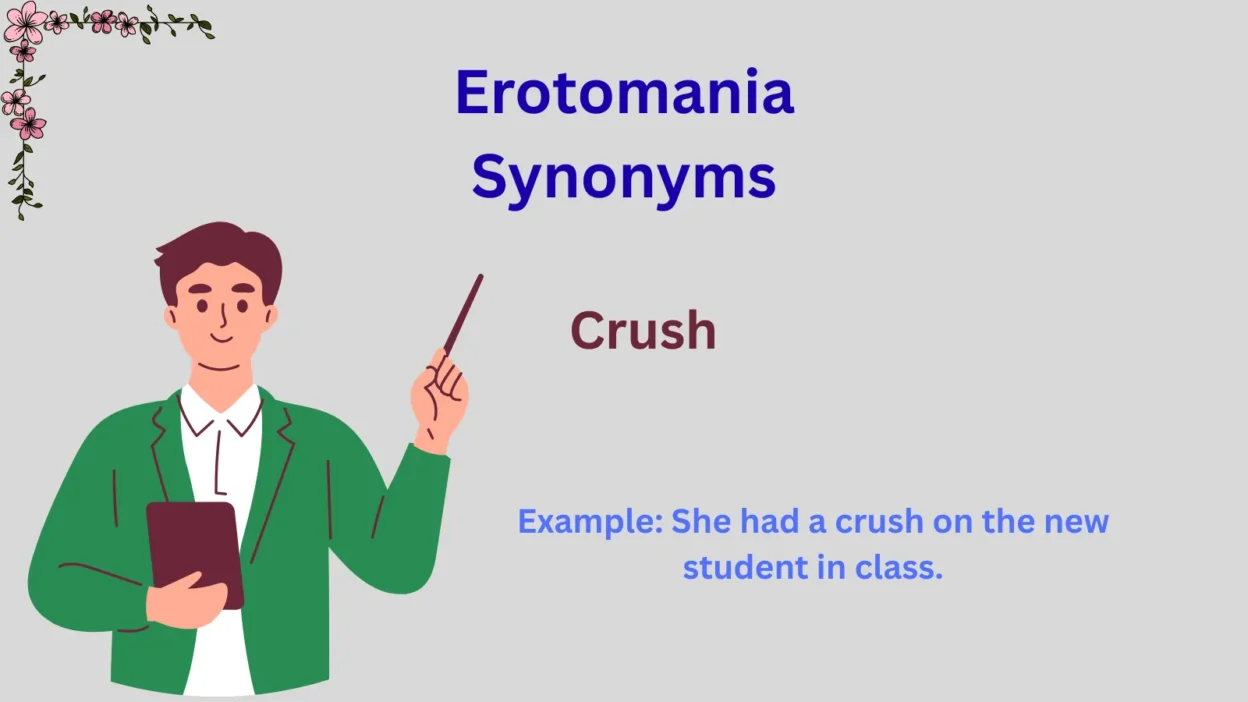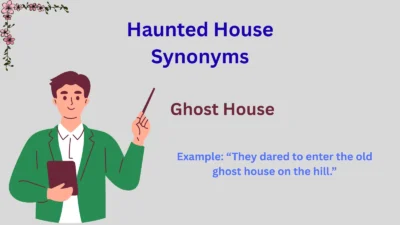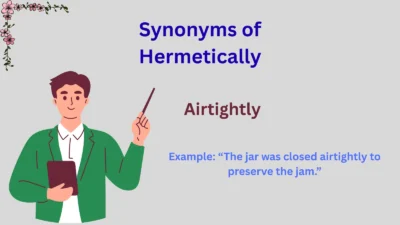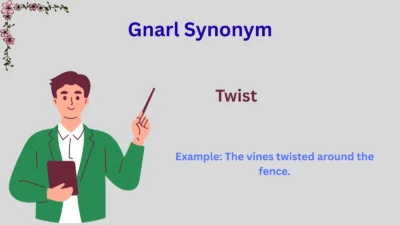Synonyms of erotomania, such as obsessive love, infatuation, and love delusion, describe an intense or unrealistic fixation on someone. For example, a person with erotomanic feelings may truly believe someone loves them back, even when it isn’t true. These terms explore how powerful emotions can blur the line between affection and obsession.
If you’re writing about psychology, emotions, or human behavior, using the right synonym for erotomania helps you describe deep, often unbalanced passion with accuracy and care.
In this guide, you’ll learn the meaning and example sentence for each synonym of erotomania, so you can understand and express the fine line between love, desire, and delusion.
What Does Erotomania Mean?
Erotomania means having an intense, often false belief that someone—usually a stranger or famous person—is in love with you. It’s more than a crush; it’s a psychological condition where affection turns into obsession.
Depending on how it’s used, erotomania can describe:
- Delusional love — believing someone loves you without proof
- Obsessive attraction — strong emotional fixation on one person
- Unrealistic passion — love that exists only in one’s mind
- Emotional dependency — needing constant signs of affection or attention
At its core, erotomania shows how powerful and consuming human emotions can be. It reminds us that love, when misunderstood or intensified, can cross the line between fantasy and reality.
30 Synonyms & Related Words for Erotomania (And When to Use Them)
1. Infatuation
Description: A strong but often short-lived passion or admiration for someone.
Example: Her infatuation with the celebrity grew after seeing him on TV.
Usage: Best for casual or non-clinical contexts; implies temporary or superficial passion.
2. Obsession
Description: Persistent, intrusive thoughts or preoccupations about someone or something.
Example: He developed an obsession with his coworker that affected his daily life.
Usage: Neutral tone; appropriate in both casual and clinical contexts.
3. Fixation
Description: A persistent attachment or focus on a person or idea.
Example: Her fixation on her high school crush lasted for years.
Usage: Often used in psychological or literary contexts; less intense than clinical erotomania.
4. Crush
Description: A light or playful romantic interest, often temporary.
Example: She had a crush on the new student in class.
Usage: Casual, youthful tone; not suitable for serious or clinical contexts.
5. Infatuated Love
Description: Romantic feelings based on idealized perceptions rather than reality.
Example: He was infatuated with his neighbor, imagining they were perfect for each other.
Usage: Suitable for literary or casual descriptions of strong desire without clinical implications.
6. Passion
Description: Intense emotion or desire toward someone or something.
Example: Her passion for him clouded her judgment.
Usage: Broad; can describe healthy or unhealthy attachment depending on context.
7. Adoration
Description: Deep love and respect.
Example: The fan’s adoration for the singer was evident in every fan letter.
Usage: Emphasizes respect and admiration more than obsession.
8. Crush Obsession
Description: A more intense form of a crush, bordering on compulsive thoughts.
Example: His crush obsession led him to follow her social media constantly.
Usage: Casual but intense; fits informal discussions of extreme infatuation.
9. Mania
Description: Excessive enthusiasm or desire.
Example: His mania for the actress made him write daily letters to her fan club.
Usage: Can be dramatic or clinical; pair with modifiers for clarity (e.g., “romantic mania”).
10. Passionate Fixation
Description: Intense, often obsessive emotional focus on a person.
Example: Her passionate fixation on the artist was apparent in her every action.
Usage: Literary or descriptive; emphasizes intensity.
11. Romantic Delusion
Description: Belief in a romantic connection that does not exist.
Example: He lived under a romantic delusion that she was secretly in love with him.
Usage: Clinical or literary; stresses the irrational belief aspect.
12. Love Obsession
Description: Overpowering, often irrational desire for someone.
Example: His love obsession interfered with his work and friendships.
Usage: Neutral tone; can be used in psychological discussions or casual storytelling.
13. Infatuated Obsession
Description: A combination of temporary attraction and persistent preoccupation.
Example: She had an infatuated obsession with the musician’s every move.
Usage: Appropriate in both literary and informal contexts; emphasizes intensity and irrationality.
14. Obsessive Love
Description: Extreme, often controlling or possessive love.
Example: Obsessive love can lead to destructive behaviors if unchecked.
Usage: Often clinical or serious in tone; suitable for psychology articles or cautionary tales.
15. Unrequited Passion
Description: Deep affection for someone who does not reciprocate.
Example: His unrequited passion made him write love letters she never received.
Usage: Literary or emotional tone; highlights imbalance in affection.
16. Crush Fixation
Description: Persistent preoccupation with someone admired from afar.
Example: Her crush fixation caused her to memorize every detail about him.
Usage: Casual, youth-oriented context; conveys intensity without clinical severity.
17. Erotic Delusion
Description: False belief in a sexual or romantic relationship.
Example: The patient’s erotic delusion involved thinking a famous actor was secretly in love with her.
Usage: Clinical or psychiatric; emphasizes delusional component.
18. Romantic Fixation
Description: Continuous mental focus on a romantic interest.
Example: His romantic fixation was apparent in his daily diary entries.
Usage: Descriptive or literary; neutral tone.
19. Love Fantasy
Description: Imagined romantic scenarios, often unrealistic.
Example: She indulged in love fantasies about meeting the prince.
Usage: Casual or literary; emphasizes imagination rather than delusion.
20. Obsessive Infatuation
Description: Intense preoccupation combined with irrational attraction.
Example: His obsessive infatuation led him to follow her everywhere.
Usage: Stronger emotional tone; works in both casual and serious discussions.
21. Love Mania
Description: Extreme or excessive romantic desire.
Example: Love mania drove him to extreme gestures of affection.
Usage: Dramatic, literary, or clinical contexts.
22. Romantic Obsession
Description: Persistent and overpowering romantic desire.
Example: Her romantic obsession overshadowed all her other relationships.
Usage: Neutral tone; versatile in both psychological and literary writing.
23. Erotic Fascination
Description: Strong sexual or romantic intrigue with someone.
Example: His erotic fascination made him follow the actress’s career obsessively.
Usage: Slightly sexual tone; best in adult literary contexts.
24. Passionate Infatuation
Description: Strong, emotionally charged attraction.
Example: Her passionate infatuation colored every thought about him.
Usage: Emotional or literary; emphasizes intensity over rationality.
25. Stalker Mentality
Description: Obsessive attention toward someone, often invasive.
Example: The stalker mentality of the fan alarmed the celebrity’s security team.
Usage: Serious, often negative; used in crime or psychological discussions.
26. Delusional Love
Description: Belief in an imagined romantic attachment.
Example: Delusional love led him to think she secretly sent him signals every day.
Usage: Clinical or psychological; stresses irrationality.
27. Devotion Obsession
Description: Over-the-top, often irrational dedication to a person.
Example: Her devotion obsession was visible in her constant messages and gifts.
Usage: Literary or descriptive; emphasizes loyalty gone extreme.
28. Romantic Fixation Syndrome
Description: An informal term describing excessive focus on a romantic interest.
Example: He seemed to suffer from romantic fixation syndrome, unable to move on.
Usage: Semi-clinical, humorous, or literary; conveys obsessive focus.
29. Erotic Preoccupation
Description: Constant attention or thoughts about sexual or romantic matters.
Example: Her erotic preoccupation distracted her from work.
Usage: Adult or psychological tone; can be clinical or descriptive.
30. Infatuated Delusion
Description: Strong but unrealistic or irrational romantic beliefs.
Example: His infatuated delusion made him imagine secret messages in her texts.
Usage: Literary or clinical; highlights the gap between perception and reality.
Choosing the Right Synonym
Selecting the right synonym depends on tone, context, and emotional nuance:
- Casual vs. Clinical: Words like crush or infatuation suit informal writing, while erotic delusion or delusional love are better for clinical or serious contexts.
- Intensity: Terms like obsession and passionate fixation convey higher intensity than adoration or crush.
- Rational vs. Irrational: Words emphasizing delusion (romantic delusion, infatuated delusion) signal irrational beliefs.
- Sexual vs. Romantic: Erotic preoccupation or erotic fascination emphasize sexual desire, whereas romantic obsession or adoration focus on emotional connection.
- Literary Flair: Synonyms like love fantasy or passionate infatuation work well in novels or poetry for expressive effect.
Cultural and Emotional Considerations
Cultural norms can affect which synonym feels appropriate. For instance, infatuation is widely accepted in everyday conversation, while erotic delusion might feel clinical or taboo in casual settings. Emotional tone also matters: adoration conveys warmth and respect, whereas stalker mentality evokes unease or alarm.
Conclusion
Synonyms of erotomania—like infatuation, obsession, and delusional love—show how deep feelings can turn overpowering or unrealistic. Each word captures a different side of love that goes too far, from emotional fixation to imagined affection.
These other name of erotomania helps you write with more depth and empathy when exploring human emotion. They remind us that love is powerful but can become unhealthy when it loses balance.
True connection comes from understanding, not illusion—and knowing that makes all the difference.



